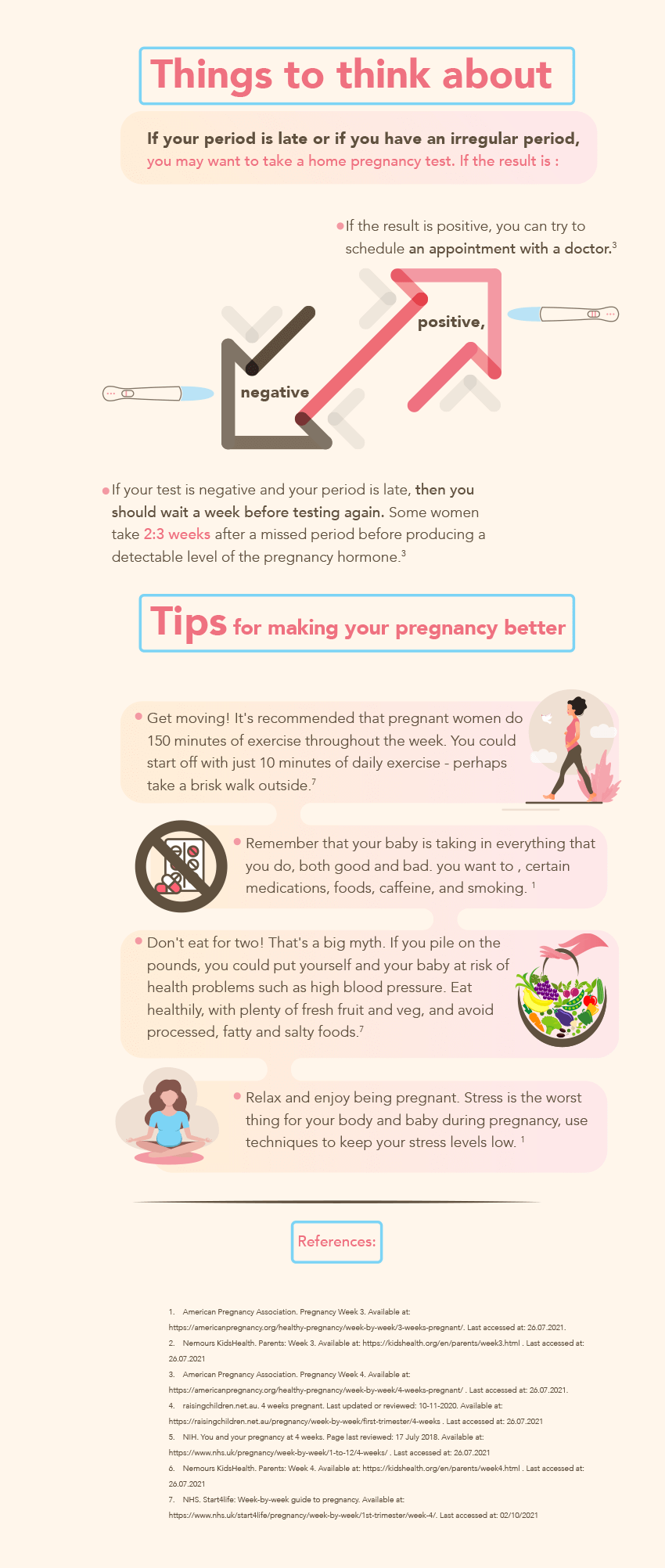Pregnancy Week 3 & 4
Even if you dont feel pregnant right now, you have a baby growing and developing inside you!


Your Pregnancy Week 3
The third week of pregnancy is usually when ovulation and implantation occur.1
What is happening with your baby at pregnancy week 3?
Your baby was just conceived, but already is working overtime. The fertilized egg goes through a process of cell division.
About 30 hours after fertilization, it divides up into two cells, then 4 and 8 and continues to divide as it passes from the Fallopian tube to the uterus.2
When it reaches the uterus, it seems like a small ball known as a blastocyst.2
Near the end of this week, the blastocyst will attach itself to the endometrium, the lining of the uterus. This is called implantation.2
How big is your baby when you are three weeks pregnant?
Your baby is the size of the head of a pin.1
Your Body2
- Getting enough of certain nutrients, such as folic acid, protein, calcium, and iron, is essential for your baby's development
- Your intake of protein, which is used to create new tissue, should increase during pregnancy.
- Calcium aids the development of bones and teeth, so make sure you're getting a good dose of dairy products, leafy green vegetables, and legumes (beans, peas, lentils, etc.).
- Iron is essential during pregnancy as you support your baby's increasing blood volume. Good sources of iron include red meat, legumes, eggs, and leafy green vegetables.
Your Pregnancy Week 4
Congratulations! Pregnancy weeks four through seven are when most women discover they are pregnant.3
What is happening with your baby when you are 4 weeks pregnant?
By the end of this week, it’s a ball of about 200 cells. Inside the ball, three layers are forming:4,5
- the inner layer becomes the breathing and digestive systems, including the lungs, stomach, gut, and bladder
- the middle layer becomes the heart, blood vessels, muscles, and bones
- the outer layer becomes the brain and nervous system, the eye lenses, tooth enamel, skin, and nails
Two other structures that develop now:6
- The amnion, filled with amniotic fluid, will surround, and protect the embryo.
- The yolk sac will produce blood and nourish the embryo until the placenta takes over that role.
How big is your baby?
- Your baby is the size of a poppy seed7
Your Body6
- After implanted, the embryo makes a hormone called human chorionic gonadotropin (hCG), which:
- Helps maintaining the lining of the uterus.
- signals to the ovary to stop releasing an egg each month, which stops your monthly periods.
- HCG is the hormone that's measured in pregnancy tests. This week, a pregnancy test probably could detect your pregnancy.
- HCG also causes the symptoms of pregnancy. Tiredness, tingling or aching breasts, or nausea also can happen with premenstrual syndrome (PMS). But by the end of this week, your period won't happen. Instead, your pregnancy is underway!
Things to think about
- If your period is late or if you have an irregular period, you may want to take a home pregnancy test. If the result is positive, you can try to schedule an appointment with a doctor.3
- If your test is negative and your period is late, then you should wait a week before testing again. Some women take 2 to 3 weeks after a missed period before producing a detectable level of the pregnancy hormone.3
Tips for making your pregnancy better
- Get moving! It's recommended that pregnant women do 150 minutes of exercise throughout the week. You could start off with just 10 minutes of daily exercise - perhaps take a brisk walk outside.7
- Remember that your baby is taking in everything that you do, both good and bad. you want to avoid certain medications, certain foods, caffeine, and smoking.1
- Don't eat for two! That's a big myth. If you pile on the pounds, you could put yourself and your baby at risk of health problems such as high blood pressure. Eat healthily, with plenty of fresh fruit and veg, and avoid processed, fatty and salty foods.7
- Relax and enjoy being pregnant. Stress is the worst thing for your body and baby during pregnancy, use techniques to keep your stress levels low.1
References:
- American Pregnancy Association. Pregnancy Week 3. Available at: https://americanpregnancy.org/healthy-pregnancy/week-by-week/3-weeks-pregnant/. Last accessed at: 26.07.2021.
- Nemours KidsHealth. Parents: Week 3. Available at: https://kidshealth.org/en/parents/week3.html. Last accessed at: 26.07.2021
- American Pregnancy Association. Pregnancy Week 4. Available at: https://americanpregnancy.org/healthy-pregnancy/week-by-week/4-weeks-pregnant/. Last accessed at: 26.07.2021.
- raisingchildren.net.au. 4 weeks pregnant. Last updated or reviewed: 10-11-2020. Available at: https://raisingchildren.net.au/pregnancy/week-by-week/first-trimester/4-weeks . Last accessed at: 26.07.2021
- NIH. You and your pregnancy at 4 weeks. Page last reviewed: 17 July 2018. Available at: https://www.nhs.uk/pregnancy/week-by-week/1-to-12/4-weeks/ . Last accessed at: 26.07.2021
- Nemours KidsHealth. Parents: Week 4. Available at: https://kidshealth.org/en/parents/week4.html . Last accessed at: 26.07.2021
- NHS. Start4life: Week-by-week guide to pregnancy. Available at: https://www.nhs.uk/start4life/pregnancy/week-by-week/1st-trimester/week-4/. Last accessed at: 02/10/2021
- NIH. You and your pregnancy at 4 weeks. Page last reviewed: 17 July 2018. Available at: https://www.nhs.uk/pregnancy/week-by-week/1-to-12/4-weeks/ . Last accessed at: 26.07.2021
- Nemours KidsHealth. Parents: Week 4. Available at: https://kidshealth.org/en/parents/week4.html . Last accessed at: 26.07.2021
- NHS. Start4life: Week-by-week guide to pregnancy. Available at: https://www.nhs.uk/start4life/pregnancy/week-by-week/1st-trimester/week-4/. Last accessed at: 02/10/2021